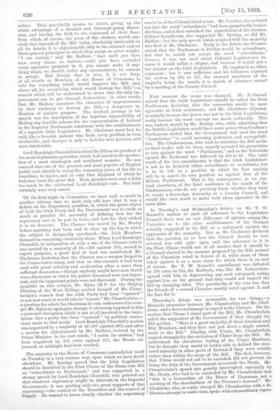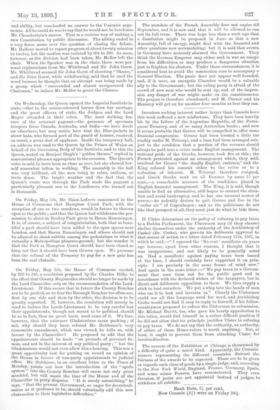Thursday's debate was memorable for two things,—a Homeric encounter between
Mr. Chamberlain and Mr. Glad- stone, and a fierce scrimmage in regard to the Closure. On the motion that Clause 1 stand part of the Bill, Mr. Chamberlain asked the supporters of the Government if they thought the Bill perfect. "Here is a great majority of three hundred and fifty Members, and they have not put down a single amend- ment to the Bill." Dealing with Ulster, Mr. Chamberlain argued strongly for the exclusion of Ulster from the Bill. He understood the chivalrous feeling of the Ulster Members, but he thought they would be better able to defend the scat. tered minority in other parts of Ireland if they were outside rather than within the scope of the Bill. The fact, however, that Ulster would not ask to be excluded, did not prevent its being the duty of the Government to exclude the North. Mr. Chamberlain's speech was greatly interrupted, especially by Mr. Healy, who had to be reminded by Mr. Chamberlain that "this is a Committee of the House of Commons, not a, meeting of the shareholders of the Freeman's Tournat." Mr. Gladstone, who, in reply, charged Mr. Chamberlain with a de- liberate attempt to waste time, spoke with extraordinary vigour and ability, but vouchsafed no answer to the Unionist argu- ments. All he could do was to say that he would not be lured into Mr. Chamberlain's snares. That is a curious way of making a new Constitution by public discussion. The sitting ended in a very fierce scene over the question of closing the debate. Mr. Balfour moved to report progress at about twenty minutes to twelve, but the motion was resisted by 304 to 260. As soon, however, as the division had been taken, Mr. Mellor left the chair. When the Speaker was in the chair, there were per- sonal explanations from Mr. Whitbread and Sir John Gorst. Mr. Whitbread accused Sir John Gorst of shouting "Shame," and Sir John Gorst, while withdrawing, said that he used the word because he thought that an attempt was being made by a group which " surrounded and almost overpowered the Chairman," to induce Mr. Mellor to grant the Closure.



































 Previous page
Previous page